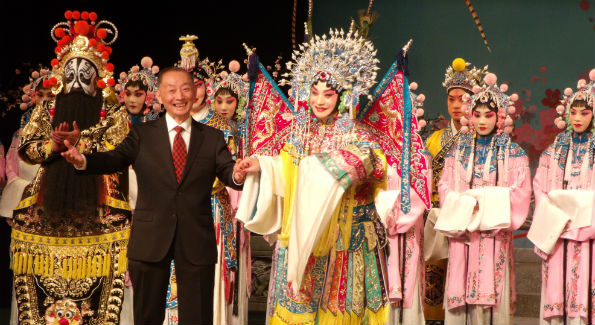Performances of traditional Chinese plays marked the 120th birthday of Mei Lanfang.
By Patrick D. McCoy

The Jingju Theater Company of Beijing presented an evening of Peking Opera at The Kennedy Center. Director of the Mei Landfang Jingju Troupe, Mei Baojiu (left), joined the cast on stage at the curtain call. (Photo by Patrick D. McCoy)
How do you celebrate a 120th birthday? Well, the Jingju Theatre Company of Beijing toasted the great Chinese master of Peking Opera, Mei Lanfang, with a series of performances featuring this traditional style of Chinese opera at the Kennedy Center Opera House. According to Chen Weihua of the China Daily, Mei Lanfang was the first Peking Opera actor to present Peking Opera outside the country, when he toured the United States in 1930 going to cities such as New York, Chicago and San Francisco. Elizabeth Wichmann-Walczak, director of the Center for Chinese Studies at the University of Hawaii, hosted the performance and celebrated actress Tsai Chin, best known for her starring role in the movie “The Joy Luck Club,” gave special remarks in recognition of the landmark occasion. Chin is the third daughter of legendary Peking Opera performer and actor Zhou Xinfang.
When we think of performances of opera in the U. S. and Europe, we tend to think of grand costumes, imposing sets and rich colors. And that is exactly what was seen in the performances of classic plays of the Mei School. However, for those who may have not had previous exposure to Peking Opera, the musical expectation from the use of the word “opera” may have fallen short. This particular genre of music was not the familiar melodic sounds of recognized composers such as Mozart, Verdi or Puccini. Rather, the music and instruments were primitive in nature, reflecting the cultural and deeply spiritual principles of Asian culture. The evening focused on the presentation of four plays that were underscored by the traditional Chinese orchestra conducted by Zhu Shaoyu. This performance provided an inside look into the execution of “opera” in a manner outside of the traditional Western tradition, for an audience who not have been familiar with such work.
The focus of each of the four Mei School plays seemed to be on one or two characters, with the ensemble cast bringing the work to its close. In the opening play, “The Goddess of Heaven Scatters Flowers,” the story of Aspara unfolded against a backdrop of beautiful flowers including cherry blossoms. As Aspara, goddess of heaven, Dou Xiaoxuan commanded the center of attention with her ornate physical beauty and emotional depth. Graceful movements enhanced by the carefully paced music of the orchestra created an ethereal tone. At the end of the scene, flowers showered down from above, further punctuating the theme of the play and bringing it to a moving close. There was such contrast in the stories, as the performance moved from the graceful to martial, in the third of the evening’s offerings, “Resisting Jin Troops.” Complete with fierce acrobatics and fight sequences, the clashing cymbals and drums provided the perfect picture of battle. Rounding out the evening were the plays “Farewell My Concubine” and “Drunken Beauty.”
The contributions of Peking Opera were recognized previously at a reception held at the Embassy of China and a prior performance was presented in New York at Lincoln Center.
Recently named among the Forty Under 40 for his contributions to arts and humanities, Patrick D. McCoy received a B.M. in vocal performance from Virginia State University and a M.M. in church music from the Shenandoah Conservatory in Winchester, Va. , where he serves on the alumni board of directors. He has contributed arts and culture pieces to CBS Washington, The Afro-American Newspaper and the newly published book, “In Spite of the Drawbacks” (Association of Black Women Historians), which includes his chapter on legendary soprano Leontyne Price. McCoy has interviewed some of the most acclaimed artists of our time, including Renée Fleming, Joshua Bell, Martina Arroyo, Denyce Graves, Eric Owens, Norman Scribner, Julian Wachner, Christine Brewer and Lawrence Brownlee. He is music director at Trinity Episcopal Church, DC. Listen to these interviews and others at Blog Talk Radio. Additionally, he is a member of the Music Critics Association of North America. McCoy may be reached via email at wlperformingarts@aol.com and on Twitter @PatrickDMcCoy.




